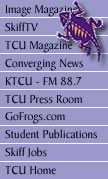
|
IronMail trial seeks to eliminate spam University
officials say if the new pilot project to eliminate unwanted e-mails
is successful by the end of its 30-day trial period, TCU’s
e-mail system will be set to automatically block spam. Assistant
Provost for Information Services David Edmondson said the new IronMail
program from CipherTrust, a company that specializes in identifying
and eliminating spam, began its trial Jan. 10 and will be completed
by mid-February. According
to the initial proposal by Information Services, the current e-mail
system processes an average of 91,000 messages a day for students,
faculty and staff. Many studies estimate spam to account for up
to 50 percent of all e-mail traffic, according to the proposal. Edmondson
said the 40 percent to 60 percent of spam that constantly weighs
down the system is limiting TCU’s computing resources. TCU
needs to conserve its money and resources to provide access and
security to the TCU community, and the elimination of spam may help
that, he said. Edmondson
said a basic set of anti-spam rules has been programmed into the
system that assigns a kind of value to certain tagged words. If
an e-mail’s value goes above a certain limit, the e-mail is
labeled spam, he said. “The
list of words we flag is dynamically changing,” Edmondson said.
“We’re constantly adding and subtracting words.” IronMail
has the options of letting all mail in, tagging the mail with the
“Possible Spam” label or blocking spam entirely, according
to the proposal. “The
pilot project is to help students recognize what will eventually
be blocked spam,” Edmondson said. However,
Loni Reynolds, a senior Spanish major, said the new program doesn’t
get rid of the problem. “What’s
the point of telling me it’s spam if there’s nothing I
can do about it?” Reynolds said. Reynolds
said she does not use her TCU account as her primary e-mail account,
but she is still bombarded with spam. While the new system labels
the unwanted e-mails, and some wanted ones, as spam, it does not
help block it, Reynolds said. Edmondson
said one possible downside is that students won’t even know
an e-mail existed if it’s been blocked. He said the success
of the pilot project will be determined by student feedback. “So
far, there has been 99.99 percent positive feedback,” he said. “We’re
trying to assess e-mail and determine what is useful to you and
what is not useful to you,” Edmondson said. Edmondson
said students should use separate e-mail accounts for more personal
mail that may be rejected as spam. Using TCU e-mail accounts at
online sites is an easy way to attract spam, he said. The
network is shared by the entire TCU community, Edmondson said. “I
personally think the TCU e-mails, like the weekly announcements,
are the most annoying spam I get,” Hunter said. Edmondson
said he will meet with seven committees, including the Technology
Steering Committee and the Chancellor’s Cabinet, during the
first week of February to discuss the program. He said the IronMail
program may allow students more personal control over filter options
in future, but that’s still a way off. Sarah
Chacko |
|
|
TCU Daily Skiff © 2002 |
||
